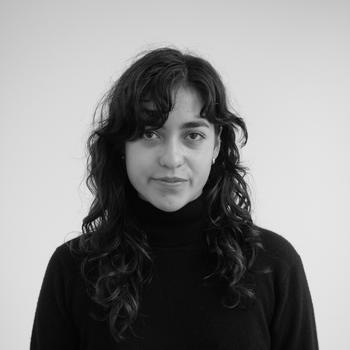Miranda Bonfil
Education
|
Since 10/24 |
Doctoral research fellow. DFG- Research training group “Normativity, Critique, Change”. |
|
08/20-04/24 |
M.A. Religion and Culture at the Humboldt Universität zu Berlin |
|
03/18 – 08/18 |
Exchange semester at the Institut für Geschichtswissenschaften, Humboldt Universität zu Berlin. |
|
08/14 – 07/21 |
B.A. History. Universidad Nacional Autónoma de México (UNAM). |
Work Experience
|
Since 05/20 |
Member of the editorial board at Fractal Magazine |
|
06/24-09/24 |
Academic Management Assistant at the International Research Training Group 'Temporalities of Future' |
|
04/23-09/24 |
Student Assistant at Zentrum für Literatur- und Kulturforschung (ZfL), Berlin. Research project: “Cultures of Miracle. Processional Theater and the Cult of Images as Global Network Phenomena in the Early Modern Era.” Dr. Johanna Abel. |
|
08/20-08/21 |
Junior Editor at Consejo Nacional de Humanidades Ciencias y Tecnologías (Conahcyt), México. |
“Historiography”. Area of Historicity Studies at 17, Instituto de Estudios Críticos, Mexico City. Summer 2023, Winter 2023.
“History of Modernity”. Teaching assistant to Prof. Javier Rico, Universidad Nacional Autónoma de México. Winter 2017.
The Apocalypse as a Regulatory Narrative in the New World
This research focuses on the regulatory functions of apocalyptic narratives and their role as a source of normative and critical practices within political communities. To address this broad theoretical problem through a focused case study, it will examine the influence of Christian apocalyptic eschatology on the development of regulatory frameworks in the American colonies of the Spanish Empire, specifically in the Viceroyalties of New Spain and Peru (16th-18th Centuries). By analyzing the millenarist-infused endeavors of the Franciscan order, it will explore how apocalyptic motives were adapted and translated to foster a Christian community amongst the indigenous populations. Additionally, it will study the reception of these apocalyptic narratives through written and visual sources. Departing from the idea of the theological canon as an apparatus that produces normativity through transformative iteration, the research aims to further understand the critical and normative uses of the apocalyptic narratives in the New World.
Research Interests:
- Philosophy of Religion
- Theories of Modernity
- Apocalyptic Literature
- Conceptual history and Metaphorology
Articles
With Fernando Beresñak, “Mediación tecno-científica y el absolutismo de la realidad”, Bajo Palabra (In print)
“Gnosticismo y modernidad. Un pasado en disputa“, in Camila Joselevich (ed.), Heresiologías. Operaciones teológico-políticas sobre la disidencia en la historia, Universidad Nacional Autónoma de México, 2024.
“La figura de Prometeo en la reflexión de Blumenberg”, in Ricardo Laleff Ilieff, Gonzalo Ricci Gernadas (eds.), Hans Blumenberg. Lecturas teórico-políticas en el Centenario de su nacimiento, Instituto de Investigaciones Gino Germani-CLACSO, 2021.
With Jonathan Juárez Melgoza, Eduardo Yescas Mendoza, “Teología política y apertura posfundacional”, Interpretatio. Revista de Hermenéutica, 4.1, March-August 2019, pp. 47-71.
“La disputa interpretativa entre Carlos de Sigüenza y Góngora y Eusebio Kino en torno al cometa de 1680”, Vorágine. Revista Interdisciplinaria de Humanidades y Ciencias Sociales, v.1, n.1, October 2019.
Talks
“Metaphorology and Political Theology”. Workshop: On the Epistemic and Political Significance of Metaphors. Universität Innsbruck/BUAP. 30.09.24.
“Performing Gender in the Spanish Empire”.Global History Student Conference.Freie Universität Berlin. 01.07.23.
“Prometeo en disputa: técnica e historicidad en el debate entre Blumenberg y Schmitt”. Pensar con Hans Blumenberg. Nuevas investigaciones en filosofía y humanidades. Universidad Complutense de Madrid/Universidad del Rosario. 27.10.20
“Sufrimiento, erotismo y salvación: un análisis de la figura de San Sebastián”. VI Jornadas de Filosofía de la religión: Religiosidad y sufrimiento: simbólicas de lo terrible. Universidad Nacional Autónoma de México (UNAM). 18.08.20
“La legibilidad de los cielos. Los debates astronómicos del siglo XVII en la Nueva España”. VII Congreso de los historiadores de las ciencias y las humanidades. Universidad Autónoma Metropolitana (UAM).10.03.20
“Genealogía y territorio: reflexiones sobre la obra de Giacomo Marramao” Congreso Internacional: La autonomía de lo político. Homenaje a Giacomo Marramao. Universidad Iberoamericana. 13.02.19.
“El problema del gesto en la Crucifixión de Cimabue”. Coloquio Nuevas Miradas en torno a la Historia del Arte.Universidad Nacional Autónoma de México (UNAM). 25.04.19
“Contra natura: sexualización y criminalización del pecado”. Coloquio Teología y política. Universidad Nacional Autónoma de México (UNAM). 8.02.18.
“Acerca del concepto moderno de religión” II Coloquio en historia de las religiones, Sociedad Mexicana para el Estudio de las Religiones (SMER). 18.05.17.
“Las raíces cristianas del pensamiento moderno: Karl Löwith y la filosofía de la historia”. La actualidad de la filosofía de la historia. Universidad Nacional Autónoma de México (UNAM). 23.03.2017.





